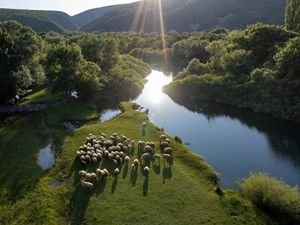Final YES for Europe's Nature Restoration Law
Historic achievement for Europe as the Council of the EU successfully adopts the world's first-ever Nature Restoration Law
Media Contacts
-
Barbara Kuznik
The Nature Conservancy Europe
Email: barbara.kuznik@tnc.org
After months of deliberations, the adoption of the world's first Nature Restoration Law by the 27 countries of the EU signifies a unified commitment to restoring our natural world, which is critical for both nature and people. This landmark decision concludes a long process of uncertainty and intense negotiations, where common sense, respect for science and and the democratic process ultimately prevailed.
The new law aims to restore at least 20% of the EU's land and seas, with specific targets including reversing the decline of pollinators and restoring 25,000 kilometres of rivers to free-flowing conditions. This target is instrumental to align EU policy with global commitments made by almost 200 countries to restore and protect at least 30% of our planet’s degraded ecosystems by 2030. The legislation solidifies Europe's leadership in global biodiversity restoration and protection efforts, setting a powerful example for the rest of the world.
Noor Yafai, Europe Director for Global Policy and Institutional Partnerships, expressed her relief and optimism for this groundbreaking legislation:
"Today is a momentous day for nature as EU Member States have voted to bring this historic legislation over the finish line. The world has been watching, and the EU has delivered a vital boost to efforts to implement international climate and biodiversity targets. Today’s vote means Europe can hold its head high as countries gear up for further international discussions later this year at the UN COP29 and COP16.”
“The adoption of the Nature Restoration Law has attracted support from a broad spectrum of society, including businesses and industries like the power sector, scientists, progressive farming groups, financial institutions, European mayors, European youth representatives and NGOs. Their collective advocacy helped to overcome the obstacles of disinformation campaigns run by different groups opposing the law.”
“A notable aspect of this legislation is its potential to unlock significant investment in nature and biodiversity. Within a year of the law coming into power, the European Commission plans to identify a range of sustainable financing measures to support the law’s implementation, and this poses a major opportunity to leverage public funds by unlocking large-scale private sector investments. Business supporters have already recognised the potential for this law to catalyse hundreds of millions of Euros in private financing, setting a transformative precedent for global environmental efforts."
Andras Krolopp, Europe Head of Biodiversity Policies at the Nature Conservancy, emphasised the law's significance:
"Since the unveiling of the EU Green Deal, the inclusion of a legally binding instrument for crucial nature restoration has been a beacon of hope. The Council's approval of this law strengthens the EU's commitment to biodiversity and sends a positive signal to the rest of the world. While challenges remain, the Global Biodiversity Framework provides a mandate for countries to begin essential habitat restoration efforts, with a particular focus on the 25,000 km freshwater restoration target. Cross-sector collaboration among stakeholders will be vital in these endeavours."
“This positive development underscores the urgent need for continued action to address the pressing environmental challenges facing Europe and the world. The global community must build on this momentum to combat biodiversity loss, mitigate climate change and ensure a sustainable future for future generations."
The Nature Conservancy is a global conservation organization dedicated to conserving the lands and waters on which all life depends. Guided by science, we create innovative, on-the-ground solutions to our world’s toughest challenges so that nature and people can thrive together. We are tackling climate change, conserving lands, waters and oceans at an unprecedented scale, providing food and water sustainably and helping make cities more sustainable. The Nature Conservancy is working to make a lasting difference around the world in 81 countries and territories (40 by direct conservation impact and 41 through partners) through a collaborative approach that engages local communities, governments, the private sector, and other partners. To learn more, visit nature.org or follow @nature_press on X.



